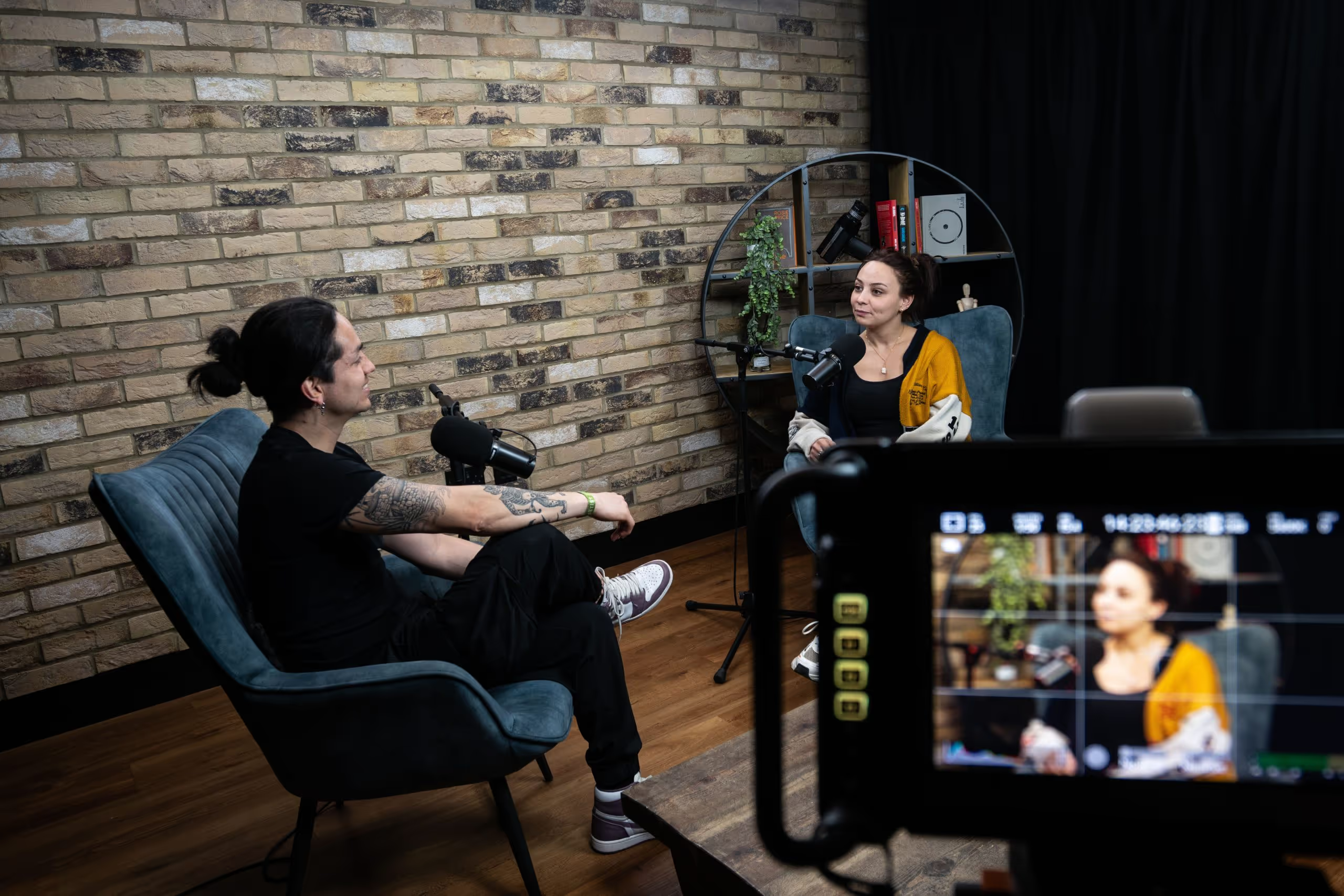How to Make Money Podcasting in 2026
This guide shows how focused shows turn attention into income in 2026. Explore pricing, expert guidance, use our CPM calculator, and discover the platforms that matter so you can grow without burning out.
Most shows don’t need millions of listeners to make money. If you serve a clear niche, you can start small: run one sponsor test and one listener supported offer, then add services or a simple product once you’ve got proof the results repeat.
Keep pricing transparent, set a sensible floor, and publish on time for six weeks. We recommend focusing on one outcome per quarter so you grow without burning out.
At TYX Podcasting Studios in London, we support creators as they move from first tests to repeatable deals by sharpening the message, improving sound, and presenting a rate card buyers trust.
Monetisation basics, what to start with
Start narrow, prove two offers, add only when results repeat

What is podcast monetisation?
Podcast monetisation means turning listener attention into income through ads, affiliate programmes, memberships, services, products, or events. The right mix depends on your audience, cadence, pricing, and proof.
It works best when your offer is specific, your audio is clean, and buying is simple. Start narrow, test one or two streams, and only add more when results repeat.
Define your niche and target audience
Pick a narrow problem, a specific listener, and one sponsor-funded outcome. That clarity speeds monetisation and makes your pitch obvious.
Spell out three things up front:
Problem: What job does the show help listeners get done?
People: Who exactly needs that help?
Path: How your format delivers the result, episode after episode.
A focused topic that solves a concrete task will attract engaged listeners and make your sponsor fit self-evident. Broad, fuzzy themes dilute both. Engaged audiences beat large, passive ones when it comes to actual revenue.
Next quarter plan: choose two measurable outcomes and let everything else serve them.
Example: grow one paid tier and close one brand in your niche. Keep all content, calls-to-action, and outreach aimed at those two moves to avoid busywork.
How many listeners do you need to start monetising?
Use seven day for pacing, thirty to ninety for pricing
You can start monetising from roughly 1,000 downloads per new episode if your niche is clear and you can show a simple plan. At that level you can run one sponsor pilot, one affiliate link, and a lightweight member perk. Network and marketplace eligibility is programme-specific.
Example: Spotify Partner Programme. To apply, you must host on Spotify for Creators, have a legal address in an eligible market, have published at least 12 episodes, hit at least 10,000 consumption hours on Spotify in the last 30 days, and hit at least 2,000 people who have streamed on Spotify in the last 30 days.
As a rough benchmark, monthly revenue often starts around $100–$1,000 for small shows and can grow to $5,000–$50,000+ as audience and pricing mature.
The line is not a rule, it's a signal. If you have true niche relevance and a clean pitch, you can move sooner. If the fit is weak, you may need more time.
Numbers are only the start. Your audience engagement, your cadence, and your proof matter as much as headcount. Sprinkle social proof in show notes, publish on time for six weeks straight, and you will feel the difference in replies. This is why most successful podcasters talk about consistency more than bursts of virality.
How many downloads do you need for stable ad revenue?
Think in tiers.
At 1,000 downloads per episode you can test a single host-read and see if listeners purchase without resistance.
At 5,000 you can sell two slots with confidence and add a simple deliverable outside the audio. Many brands start paying attention around ~5,000 downloads per episode, though programme criteria vary.
At 10,000 you can anchor your plan on ads and backfill with memberships or services. For many shows, ~10,000 downloads per episode is where you have enough headroom to shape podcasting into a primary income, assuming sensible pricing and fill.
Keep the math transparent as it builds trust with brands and paying subscribers.
How do podcasts make money? (core methods)
%20-%20visual%20selection.png)
If you're new to podcast monetisation, start with two simple offers and ship them every week. There are many ways to make money podcasting, but not all are equal at every stage.
Pick two to begin with, then expand. Your key strategies are to build a loyal audience and diversify revenue across sponsorships, affiliate marketing, memberships, and services as you grow.
Start early with a single affiliate or listener support link, then layer additional revenue streams once you have proof.
1. Sponsorship and podcast advertising
This is the default route most creators try first. Buyers understand it. You can sell ads directly to brands, or list yourself on an advertising network to surface demand while you grow. Begin with one mid roll read and one pre roll mention. Keep the copy in your voice, keep the call to action short, and put the exact link at the top of your show notes.
Host reads tend to convert better than pre produced clips because the trust sits with you, not the jingle. That said, the structure still uses CPM , cost per thousand impressions, which in podcasts means the cost per 1,000 IAB counted downloads in your chosen window.
Pre roll ads usually clear a lower number than mid roll ads, and post roll ads sit at the bottom of the range. Do not overfill, one strong message beats three weak ones
2. Affiliate marketing
A low-risk way to generate revenue early. Choose one product your audience actually needs, join its affiliate programme, and place one affiliate link in the episode. Mention it once in the script, once in the description, and once in the show notes.
Track affiliate sales every month. If conversions look healthy, ask the partner for a better rate or a custom code. Remember to start small, adding a second partner only when the first is proven.
3. Memberships, podcast subscriptions, and premium content
Listeners who love your work will pay for extra value if the perks are clear. Offer premium content through simple podcast subscriptions. Keep fulfilment light. Common perks are early access to episodes, bonus episodes every other week, and behind the scenes content that shows process rather than fluff.
Selling premium content and memberships is an exchange for a subscription fee; spell out exactly what’s included.
If your host supports it, you can deliver a private feed through your podcast’s RSS feed. Treat this like a thank-you tier that deepens the bond with a dedicated listener base rather than replacing the free show. Rotate bonus content monthly so paying subscribers know what’s coming next.
4. Audience support and crowdfunding
Some people prefer to tip rather than subscribe. Audience support can be one-off or monthly. Use it as a low-pressure option for loyal listeners who want to keep the show running. Keep the pitch polite and specific so it never feels like a tax.
If you add exclusive content, keep it simple to deliver. Platforms like Patreon make this easy by pairing support with exclusive posts, bonus audio, or community access.
5. Services and consulting services
If you're in B2B or skills teaching, this route can out-earn ads even with fewer listeners. Offer an audit, a workshop, or a package of sessions that extends what you teach on air.
Price a clear outcome, deliver a short deck, and keep the scope tight. Services are how a lot of successful podcasts fund gear, time, and growth.
6. Online courses and digital products
Turn your repeatable process into online courses or focused digital products. Start with something narrow that pairs to a single episode theme. For example, a template pack or a 90-minute video that saves the target audience a week of trial and error.
You own products like this, so the margin is yours, and you can add them to a rate card as a value add.
7. Live events
Live events reinforce community and bring a sponsor closer to your people. Start with a small room, a Q and A, and a well-timed meet-up. Record highlights to reuse in the feed. Being a physical touchpoint, events have the potential to turn casual fans into a loyal audience.
8. Merchandise
Selling branded merchandise works best once the in-jokes and visuals of the show feel strong. Use print on demand early so you do not carry stock. It keeps financial risk low because you avoid upfront inventory and sizing.
9. Platform programmes
Some platforms pay creators directly or open new surfaces for ads. Treat these programmes as supplements, not the plan. They can still be useful as you widen your mix.
Direct vs indirect income
Direct income comes from ads, sponsorships, paid memberships, and listener donations.
Indirect income comes from consulting, speaking, coaching, courses, books, and other services the show helps you sell.
Sponsorships tend to become more accessible around ~5,000 downloads per episode, but niche fit can trump raw scale. Many hosts monetise faster by productising their expertise for the audience they already serve.
What to charge and how to pitch it
CPM bands, calculator, placements, and a one-page kit
What should you charge for podcast ads in 2026?
Most buys price on CPM (cost per thousand impressions). Planning bands commonly land between $15–$50 CPM depending on placement, format, and niche. A simple translation: many shows net $25–$50 per 1,000 downloads from ads when placements and fill are steady. Sponsor buys often fall between $18–$50 CPM, with mid-roll and host-read at the upper end.
Podcast CPM calculator
Estimate cost or required downloads using IAB-counted downloads.
Ad placement cheat sheet, lengths, and planning CPM
Price on CPM to match how buyers plan, and protect your time with a clear floor. Keep the arithmetic visible in your pitch so nothing feels vague, show the simple steps that lead to the number. You will hear big figures on forums, treat them as noise until you have repeatable proof from your own show, then anchor your plan to that proof.
Placement still matters. One clear mid roll read is usually the workhorse, with a short pre roll to open the door and build quick recall. Post roll can work for low friction actions if listeners stay to the end. Keep the script short and natural, use a small story to set context, then make one specific ask.
What goes in a podcast media kit?
Brands buy outcomes, not just reach. Keep the kit to one page. Add three lines about the target audience, one line on the job your show does, a short list of relevant categories, and three average numbers for recent episodes.
Include a small section that frames multiple revenue streams, for example a presenting slot plus a clip and a link in the newsletter. Finish with a plain description of the creative process so podcast hosts at the brand can imagine how the read will sound.
What should your rate card include?
Aim for three packages, each with one purpose.
Use a CPM anchor but add a base price so small numbers still make sense. Show both a USD figure and a GBP figure. Tell prospects you will sell ad space only where the promise matches your people. That protects trust and keeps your calendar sane.
How to pitch brands that already buy podcast ads
They will expect clean audio, consistent publishing, a short sample read, and a plan for dynamic ad insertion in the back catalogue. They also want you to be reachable. Reply fast and set simple rules. Share routine updates the same day every week of the flight. Most conversations fall over when details go missing. Your steadiness is a signal that you're a safe bet.
Memberships, affiliates, cadence, and conversion
Choose one paid tier, one partner, publish weekly, signpost the next step
Make the most of membership and premium content
If you run a premium tier, keep the offer obvious. People pay for access, time, and clarity, not complication. Early access is the simplest perk. Bonus episodes work if they are focused and short. Behind the scenes content plays best when it teaches process or shows decisions, not when it’s just small talk.
You can add exclusive content a few times per quarter, but let your free feed keep doing the heavy lifting. Your paid subscriptions should feel like a thank-you layer, not a wall.
Pick affiliate partners without confusing your listeners
Choose one clear fit per quarter. Join the affiliate programme, test the product yourself, and write the read like a recommendation to a friend who has the same problem as the rest of your audience. Place the affiliate link in one consistent spot, then read it once and move on.
If conversions look good, ask for a better rate or a unique vanity URL. If it tanks, cut it. It's more important to protect the relationship with your listeners; an engaged audience does not stay engaged if you sound like a billboard.
How often should you publish your podcast?
Consistent publishing is a quiet superpower. Weekly beats sporadic because it not only trains habit, but short, sharp episodes tend to travel well. If you're unsure what to cut, consider ditching the preamble. Give people the point, then give them the proof. Keep your trims and room tone tidy in post so the experience stays smooth.
High quality content sounds simple and lands harder. Establishing a reliable cadence builds trust that compounds over time.
Structure your podcast content for conversions
Each episode should lead to one clear next step. If the goal is to grow a list, send them to a low-friction page. If the goal is to seed a service, mention a single slot for a call. If the goal is to prime a sponsor, craft the story so the product slips in as a natural example. Rememeber, you're not trying to be clever; you're trying to be useful.
Which platforms matter for podcast discovery in 2026?
Cover the big three first, then two open-ecosystem apps
For discovery in 2026, start where most listeners already are: Apple Podcasts, Spotify, and YouTube plus YouTube Music. Those three cover most search and sharing.
Then round out your footprint with Amazon Music/Audible and a couple of open-ecosystem staples like Overcast, Pocket Casts, and Podcast Addict so fans can listen where they already are. Repurpose highlights for YouTube and social to widen discovery without recording more.
Keep the path short: from search to play to a clear contact route in two clicks or fewer. If a platform adds more steps without meaningful reach (for example, a minor app that doesn’t index your RSS), skip it and keep your calendar sane.
Apple Podcasts
Apple Podcasts is the baseline for the open podcast ecosystem. Many apps index from its catalogue, so a clean listing here can lift your reach beyond Apple itself. If you run a paid tier off-platform, give members a private RSS URL they can add in Apple Podcasts. This is separate from Apple Podcasts Subscriptions.
Spotify
Spotify is a major listening app with solid creator tools. Claim your show in Spotify for Creators to tidy your listing and analytics. If monetisation is a goal, check eligibility for the Spotify Partner Program, which requires hosting on Spotify for Creators and meeting recent listening thresholds on Spotify.
YouTube / YouTube Music
YouTube and YouTube Music reach people where they already search and watch. Claim your show, keep titles clean and consistent, and use simple video or audiograms to widen the funnel.
Amazon Music / Audible
Amazon Music and Audible are quick to set up and give you extra reach inside the Amazon ecosystem. Submit once, then check your listing and categories.
Other apps (quick adds)
- Overcast: Auto-indexes from Apple; claim and tidy.
- Pocket Casts: Simple submit/claim; strong with long-time podcast users.
- Podcast Addict (Android): Large Android base; fast manual submit.
Operations and measurement
Cadence, craft, and simple metrics beat hacks.
How should you use your podcast’s RSS feed?
Your podcast’s RSS feed is the backbone of your distribution. Keep it stable and well-described. If you run tiers, set up the private feed once and document the steps. Do not add complexity for its own sake. Whether you run one show or several niche podcasts for different niches, the same rule applies. Stability beats novelty here.
What separates successful podcasts from the pack?
Successful podcasts keep their promise simple, their sound clean, and their load manageable. They talk to niche audiences with care, and they never mistake growth hacks for trust. The most successful podcasts tend to feel personal, present, and repeatable.
The most successful podcasters say no often so they can say yes to the right work. They keep a loyal audience by delivering on time, improving the craft, and choosing guests who bring signal. Trust grows episode by episode.
Do the highest earning podcasts do anything magical?
Not really. They run a tight show, honour the listener, and protect the format. Then they do ordinary things consistently for longer than most people can stand. That is why podcasts make money at the top. The lesson for the rest of us is to stay small and sharp until the signal tells us to widen.
What metrics matter when you plan your next quarter?
Keep it to three. Audience size for new episodes, reply rate from brands, and conversion on one offer. If those move, the rest follows. If they stall, ask why. Are you speaking to the right people, or are you trying to be all things to all podcast listeners?
Is your pitch in plain English, or are you hiding behind buzzwords?
Trim until the message is tight again. Connecting with listeners through email and other direct channels also helps retention and loyalty over time.
Keep your pipeline moving without boiling the ocean
Set one anchor day to send sponsor updates and one day to package one clip. Those two things keep momentum. Use a simple spreadsheet to log enquiries from other podcasters and brands. Always offer a short test flight with one outcome. As you collect proof, raise the floor price and keep your calendar honest.
Practical copy you can lift for your deck
Value statement: We speak to a dedicated audience of busy founders who need clear steps, not pep talks.
Outcome: We help them make one good decision each week, so they feel a sense of progress.
Offer: Two host-reads per month, one short clip, and a link in show notes.
Guardrails: We sell ad space only to products we would use ourselves because trust beats reach.
Maths examples you can adapt
Scenario one
8,000 downloads per episode. One mid roll read at a premium rate, one pre roll mention, 80 percent fill. Translate the CPM into a clear number. Build in a simple make-good if an episode under-delivers.
Scenario two
5,000 downloads per episode. One pre roll and one post roll read with a modest rate, 70 percent fill. Add a member tier at five pounds and aim for 2 percent uptake. That is cash that repeats while you grow the rest.
Scenario three
2,500 downloads per episode. One host-read mid roll at a fair rate, 80 percent fill. Add one affiliate link for a product your people already use. Aim for ten tracked conversions a month at a sensible commission. This is how you start monetizing without waiting for perfection.
Audience building without the noise

Audience building isn’t a separate job; it’s what happens when you deliver clear value with consistent craft. Choose one social channel you can actually sustain and commit to one email every week. Ask for replies. Let that feedback steer your topics and offers.
The loop is the point: when people are engaged, you’ll hear what to fix next; when engagement dips, it’s your cue to adjust or pause.
How to run better interviews
If you’re running interviews, book guests for the lesson they bring, not the size of their profile. Ask the question your audience wishes someone would answer plainly. Keep the conversation tight. Share a quick edit for accuracy and thank them properly afterwards.
Always remember: good guests can turn into repeat partners, some become clients, and a few become sponsors. Done thoughtfully, strategic guest work builds authority faster than any hack.
Prepare your studio time so you sound like you mean it
Book a quiet room and test your chain before you record. A short tech rehearsal saves a ruined take. Bring notes, not a script. Speak like you would to one person.
If you want help, use a professional studio and a light crew so you can focus on performance. Put simply, better audio quality has a higher chance of increasing revenue because it removes friction between you and the listener.
Final guidance on stacking multiple revenue streams
Start narrow and widen only as proof builds, running one sponsor test with one affiliate this quarter and (if the numbers hold) adding a small course next quarter or tightening a member perk. Keep every stream light enough to ship on time, and if anything starts to drag or blur the message, cut it so the winners carry the plan.
Elevate your podcast at TYX studios

TYX Podcasting Studios in London offers end to end podcast support, from planning and studio recording to editing, mastering, and video.
Record in our acoustically treated rooms with on site engineers and 4K capture, or lean on our expert production team for a full episode package.
Get in touch and find out why we're trusted by some of the industry's biggest names.
Frequently Asked Questions
Through ads (host-reads and pre/mid/post-roll), sponsorship packages, affiliate links, paid memberships/premium feeds, services (coaching, consulting), courses/digital products, live events, and merch. Most shows start with one of: a small sponsor pilot, an affiliate link, or listener support; then layer others as proof builds.
You can test a sponsor or affiliate at ~1,000 downloads per episode if the niche is tight and your pitch is clean. Interest becomes steadier around ~5,000/ep. Many shows can shape podcasting into a primary income when they’re consistently ~10,000/ep, assuming sensible pricing and ad fill.
If you're averaging around 10,000-50,000 downloads per episode, then you should earn between £400-700 a month.This will vary depending on your podcast platform, some will pay more than others. You can increase how much you earn through sponsorships, ads, and affiliate marketing.
Indirectly, via its Spotify Partner Program (and other creator tools). To qualify you must host on Spotify for Creators and, on Spotify in the last 30 days, have ≥10,000 global consumption hours, ≥2,000 unique listeners or viewers, ≥12 published episodes, plus a legal address in an eligible country. If you don’t meet that yet, you can still make money off-platform (direct sponsors, affiliates, memberships).
Pick one niche problem, publish weekly for 6 weeks, and make each episode point to one simple next step. Cross-post highlights to YouTube and one social channel, ask for replies via email, and appear on 3–5 adjacent podcasts with a clear hook and landing page. That combo usually gets a small but real audience moving.
















.jpg)

